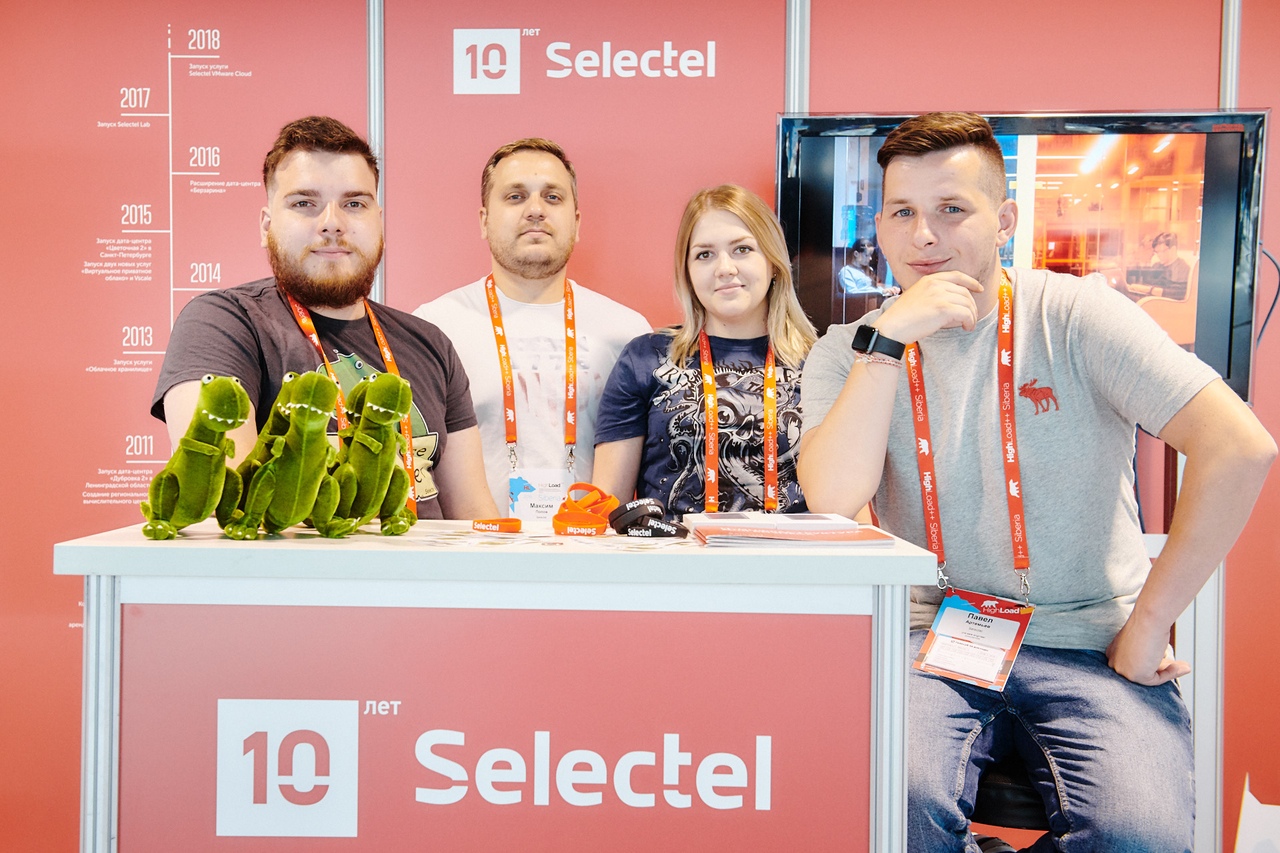A look at Highload ++ from Siberia
Disclaimer: my observations can be considered an outsider view; I have no direct relation to high-load projects. I attended the conference for a push in professional development - where else would you meet so many smart people in one place? Geography played a significant role; I didn’t even have to take a train or plane ticket.

Modern technologies, developers and large projects are concentrated in Moscow and a little - in St. Petersburg. The conference of developers of high-loaded systems Highload ++ takes more than 10 years, the format has proven itself, many people like it a lot.
IT companies in the regions are rare, but they are: the same SKB Kontur, SimbirSoft, Xored. However, far from the capitals, besides the popular remake called Innopolis, there is a mature research center: Novosibirsk State University, i.e. mathematics, computer science and IT. It is no coincidence that Plesk, 1C-Rarus, CFT opened their offices here, and 2GIS and Tekhnologika were based at all in Novosibirsk.
The idea to hold a conference here seemed logical. The local IT community appreciated the opportunity to "see and be seen by others." By the way, the organizers promised to make Highload ++ Siberia a regular event.

In my humble opinion, everything was gorgeous, the conference was held in a very advanced expo center beyond the Urals. Sometimes there was a feeling that I got abroad, everything was so clean, modern, high-tech. However, the names of the halls "Krasnoyarsk", "Irkutsk", "Abakan" were returned back to their native Siberia. Very pleased with the continuous coffee break, a convenient badge with all the key information and a simple vote for reports as a feedback. After the main program, you could chat with colleagues, have a beer and play board games. The only pity is that the Russian team on Monday did not please the Siberian IT community. Otherwise, I am glad that IT people can organize themselves and lead interesting discussions when space and time are allocated. It's great that the conference brought together participants and speakers from all over Russia and even from abroad,

The conference would be much poorer without the participation of partner companies. In addition to bright backgrounds and LCD-panels with promotional materials, the companies' representatives held draws, raffles and contests with prizes on the stands. Since without sponsors Highload would not take off at all, the business was given the opportunity to appeal to potential buyers. It was interesting to hear what is being offered on the market. Some companies right at the conference hantili specialists, it means that in Russia there is still an acute shortage of highly skilled developers.
Personally, I drew attention to three topics:
Bright and memorable report from a recognized master of his craft. The theme is new, relevant, for machine learning future. Based on Big Data, you can build predictions of what the user needs, and then check the quality of forecasts.
There was a real problem raised. Bribed that the Ops team did not use popular tools, but wrote its own solution. Let not so elegant, but satisfying the requirements of developers and testers, and most importantly - very quickly. Now they have time to evolve.
Preparing servers for work is not an easy task, for highload projects you need carefully assembled and tested hardware. And here the rule worked - to automate everything that is possible, as a result of which the author achieved impressive volumes. This report was knocked out of the rest of the rest by both hardware-specificity and genuine speaker enthusiasm, becoming for me a remarkable end of the conference.
All abstracts and presentations are available on the official website: www.highload.ru/siberia/2018/abstracts
Unfortunately, not all interesting things are visited live, you have to look at the records. Some reports provoked discussion in the conference chat room, which, I think, is more useful than private communication with the speaker. From myself I can add that live communication and presence in the hall gives a much better effect than watching the broadcast.
This Anglicism denotes a more or less informal meeting of interested participants and communication on a given topic. For me, this format was new, as in my city with mitaps, and even more so for “Ops”, admins, things are not very good. A separate mitap was dedicated to local IT communities and their development paths, collaborations, and current issues. After him, I wanted to organize myself or at least visit some mitap in my city. Once upon a time I was in the local LUG (Linux user group), the meetings at the conference left a very similar impression. Is that on the most popular topics, people stood by the walls and sat on the floor. Mitapas were not recorded, the more valuable each of them was.
Some topics, such as DevOps and Data Science, invariably gathered a crowd. It is understandable - despite the novelty of terms and approaches, they have already borne fruit and proved that the future of the IT industry is behind them. I could not resist - the concept of DevOps and its tools have been interesting for me for a long time, and simple experiments on the stands do not provide the understanding and experience that can be obtained on real high-loaded projects for which these tools were created. I attended the thematic meetings dedicated to the documentation in DevOps and the preparation of the application for launch in Kubernetes, I realized that I understand a lot, but a very large amount of knowledge and skills is yet to be mastered.
For my taste, this is one of the main advantages of such conferences. A friendly atmosphere, a lot of places for joint communication, “endless coffee break” and just a crowd of developers around have to discuss urgent problems, as well as increase the chances that someone has already solved your problem and is ready to share experience. The conference bot even had a special function: to find people with similar interests or competencies.
Thanks to the organizers, speakers and all involved!
Author: Alexander Shvalov.

Geography and life
Modern technologies, developers and large projects are concentrated in Moscow and a little - in St. Petersburg. The conference of developers of high-loaded systems Highload ++ takes more than 10 years, the format has proven itself, many people like it a lot.
IT companies in the regions are rare, but they are: the same SKB Kontur, SimbirSoft, Xored. However, far from the capitals, besides the popular remake called Innopolis, there is a mature research center: Novosibirsk State University, i.e. mathematics, computer science and IT. It is no coincidence that Plesk, 1C-Rarus, CFT opened their offices here, and 2GIS and Tekhnologika were based at all in Novosibirsk.
The idea to hold a conference here seemed logical. The local IT community appreciated the opportunity to "see and be seen by others." By the way, the organizers promised to make Highload ++ Siberia a regular event.
Organization of the conference

In my humble opinion, everything was gorgeous, the conference was held in a very advanced expo center beyond the Urals. Sometimes there was a feeling that I got abroad, everything was so clean, modern, high-tech. However, the names of the halls "Krasnoyarsk", "Irkutsk", "Abakan" were returned back to their native Siberia. Very pleased with the continuous coffee break, a convenient badge with all the key information and a simple vote for reports as a feedback. After the main program, you could chat with colleagues, have a beer and play board games. The only pity is that the Russian team on Monday did not please the Siberian IT community. Otherwise, I am glad that IT people can organize themselves and lead interesting discussions when space and time are allocated. It's great that the conference brought together participants and speakers from all over Russia and even from abroad,
Partners

The conference would be much poorer without the participation of partner companies. In addition to bright backgrounds and LCD-panels with promotional materials, the companies' representatives held draws, raffles and contests with prizes on the stands. Since without sponsors Highload would not take off at all, the business was given the opportunity to appeal to potential buyers. It was interesting to hear what is being offered on the market. Some companies right at the conference hantili specialists, it means that in Russia there is still an acute shortage of highly skilled developers.
Reports
Personally, I drew attention to three topics:
Machine learning @ booking.com
Bright and memorable report from a recognized master of his craft. The theme is new, relevant, for machine learning future. Based on Big Data, you can build predictions of what the user needs, and then check the quality of forecasts.
Test benches on request in monolith sawing conditions
There was a real problem raised. Bribed that the Ops team did not use popular tools, but wrote its own solution. Let not so elegant, but satisfying the requirements of developers and testers, and most importantly - very quickly. Now they have time to evolve.
Iron will not fail. How I prepare dozens of servers a day for a fight
Preparing servers for work is not an easy task, for highload projects you need carefully assembled and tested hardware. And here the rule worked - to automate everything that is possible, as a result of which the author achieved impressive volumes. This report was knocked out of the rest of the rest by both hardware-specificity and genuine speaker enthusiasm, becoming for me a remarkable end of the conference.
All abstracts and presentations are available on the official website: www.highload.ru/siberia/2018/abstracts
Unfortunately, not all interesting things are visited live, you have to look at the records. Some reports provoked discussion in the conference chat room, which, I think, is more useful than private communication with the speaker. From myself I can add that live communication and presence in the hall gives a much better effect than watching the broadcast.
Mitapy
This Anglicism denotes a more or less informal meeting of interested participants and communication on a given topic. For me, this format was new, as in my city with mitaps, and even more so for “Ops”, admins, things are not very good. A separate mitap was dedicated to local IT communities and their development paths, collaborations, and current issues. After him, I wanted to organize myself or at least visit some mitap in my city. Once upon a time I was in the local LUG (Linux user group), the meetings at the conference left a very similar impression. Is that on the most popular topics, people stood by the walls and sat on the floor. Mitapas were not recorded, the more valuable each of them was.
HYIP
Some topics, such as DevOps and Data Science, invariably gathered a crowd. It is understandable - despite the novelty of terms and approaches, they have already borne fruit and proved that the future of the IT industry is behind them. I could not resist - the concept of DevOps and its tools have been interesting for me for a long time, and simple experiments on the stands do not provide the understanding and experience that can be obtained on real high-loaded projects for which these tools were created. I attended the thematic meetings dedicated to the documentation in DevOps and the preparation of the application for launch in Kubernetes, I realized that I understand a lot, but a very large amount of knowledge and skills is yet to be mastered.
Informal communication and networking
For my taste, this is one of the main advantages of such conferences. A friendly atmosphere, a lot of places for joint communication, “endless coffee break” and just a crowd of developers around have to discuss urgent problems, as well as increase the chances that someone has already solved your problem and is ready to share experience. The conference bot even had a special function: to find people with similar interests or competencies.
Some (useless) statistics
- 2 work days
- 2 large conference rooms
- 3 meeting rooms
- 8 partner companies
- 42 reports
- 600 participants
- countless opportunities to share experiences
Thanks to the organizers, speakers and all involved!
Author: Alexander Shvalov.
